 In the wall text of the exhibition dedicated to African heritage “Appropriating objects and colonial fictions of Africa”, the curators state that “the current projects aim at the decolonization of collections through cooperation with partners from the societies of origin”. However, is this premise really being put into practice?
In the wall text of the exhibition dedicated to African heritage “Appropriating objects and colonial fictions of Africa”, the curators state that “the current projects aim at the decolonization of collections through cooperation with partners from the societies of origin”. However, is this premise really being put into practice?
I'll visit
30.03.2022 | by Ana Temudo
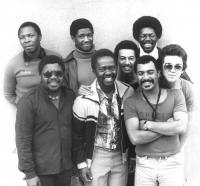 And so, as we engage with vinyl reissues such as these, we are also engaging in a fight against forgetting much more than just music. These are valuable artifacts of South Africa’s musical history that were transcendent of repressive daily conditions. Challenges remain in the here and now. The vibrant, radical artists of today’s South African jazz are the descendants of such soothsayers of the non-verbal, speaking truth to that which cannot be silenced. They are still learning to look at themselves differently, still redreaming the world, hidden gods speaking from within them a new language we will all need to learn in order to talk to each other. It’s about much more than just music.
And so, as we engage with vinyl reissues such as these, we are also engaging in a fight against forgetting much more than just music. These are valuable artifacts of South Africa’s musical history that were transcendent of repressive daily conditions. Challenges remain in the here and now. The vibrant, radical artists of today’s South African jazz are the descendants of such soothsayers of the non-verbal, speaking truth to that which cannot be silenced. They are still learning to look at themselves differently, still redreaming the world, hidden gods speaking from within them a new language we will all need to learn in order to talk to each other. It’s about much more than just music.
Games Without Borders
21.08.2021 | by Liam Brickhill
 From the 14th of July, the website of the Tchiweka Documentation Association (ATD) is open to the public, putting online a large part of the archive that, since 2006, its Documentation Center has been managing, organizing and expanding.
From the 14th of July, the website of the Tchiweka Documentation Association (ATD) is open to the public, putting online a large part of the archive that, since 2006, its Documentation Center has been managing, organizing and expanding.
I'll visit
13.07.2021 | by Associação Tchiweka de Documentação
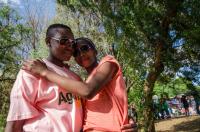 Am I a sin to God? Religious interpretation—violence in the name of God—is killing lesbian, gay, trans, bisexual and intersex persons. They might not have killed me on that bus, but have you ever seen a bus full of people, filled with the ecstasy of God? Ready to defend his words to the sinners, to stone, to judge? Those are who we live with, eat with, ride a bus with. How are we safe?
Am I a sin to God? Religious interpretation—violence in the name of God—is killing lesbian, gay, trans, bisexual and intersex persons. They might not have killed me on that bus, but have you ever seen a bus full of people, filled with the ecstasy of God? Ready to defend his words to the sinners, to stone, to judge? Those are who we live with, eat with, ride a bus with. How are we safe?
Body
16.04.2021 | by Brindley J. Fortuin
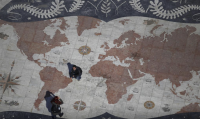 The memorial - rows of palm trees painted in black - was designed by Angolan artist Kiluanji Kia Henda and funded by Lisbon council. It will stand in the centre of the city.
From the 15th to the 19th century, Portuguese vessels carried close to 6 million enslaved Africans across the Atlantic, more than any other nation, but up to now Portugal has rarely commented on its past actions and little is taught about its role in slavery in schools.
Rather, Portugal’s colonial era, which saw countries including Angola, Mozambique, Brazil, Cape Verde, East Timor as well as parts of India subjected to Portuguese rule, is often perceived as a source of pride.
The memorial - rows of palm trees painted in black - was designed by Angolan artist Kiluanji Kia Henda and funded by Lisbon council. It will stand in the centre of the city.
From the 15th to the 19th century, Portuguese vessels carried close to 6 million enslaved Africans across the Atlantic, more than any other nation, but up to now Portugal has rarely commented on its past actions and little is taught about its role in slavery in schools.
Rather, Portugal’s colonial era, which saw countries including Angola, Mozambique, Brazil, Cape Verde, East Timor as well as parts of India subjected to Portuguese rule, is often perceived as a source of pride.
Games Without Borders
24.03.2021 | by Catarina Demony and Victoria Waldersee
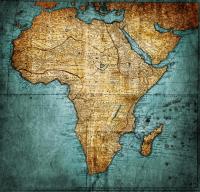 Part of our task is to build a canon, knowledge, and a way of knowing. This is happening against the backdrop of a movement by South African students to decolonise their universities; Black Lives Matter protests in the United States; and in the context of a much deeper history of national reimagination across Africa and the world.With this history in mind our faculty is working towards what we consider a decolonial social science curriculum. We’ve adopted seven commitments to help us meet this goal, and which we hope will shift educational discourse in a more equitable and representative direction.
Part of our task is to build a canon, knowledge, and a way of knowing. This is happening against the backdrop of a movement by South African students to decolonise their universities; Black Lives Matter protests in the United States; and in the context of a much deeper history of national reimagination across Africa and the world.With this history in mind our faculty is working towards what we consider a decolonial social science curriculum. We’ve adopted seven commitments to help us meet this goal, and which we hope will shift educational discourse in a more equitable and representative direction.
Mukanda
15.06.2017 | by Jess Auerbach
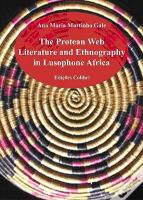 This book discusses colonial and postcolonial textuality under the theoretical scope of Literary Theory, Cultural Critique and Anthropology.
It focuses mostly but not exclusively on Angola and Moçambique. In these countries, Ethnographic Fiction has emerged as a genre that inspired until this day "violent readings" of history and society.
This book discusses colonial and postcolonial textuality under the theoretical scope of Literary Theory, Cultural Critique and Anthropology.
It focuses mostly but not exclusively on Angola and Moçambique. In these countries, Ethnographic Fiction has emerged as a genre that inspired until this day "violent readings" of history and society.
Mukanda
29.11.2011 | by Ana Maria Mão-de-Ferro Martinho
 In the wall text of the exhibition dedicated to African heritage “Appropriating objects and colonial fictions of Africa”, the curators state that “the current projects aim at the decolonization of collections through cooperation with partners from the societies of origin”. However, is this premise really being put into practice?
In the wall text of the exhibition dedicated to African heritage “Appropriating objects and colonial fictions of Africa”, the curators state that “the current projects aim at the decolonization of collections through cooperation with partners from the societies of origin”. However, is this premise really being put into practice?  And so, as we engage with vinyl reissues such as these, we are also engaging in a fight against forgetting much more than just music. These are valuable artifacts of South Africa’s musical history that were transcendent of repressive daily conditions. Challenges remain in the here and now. The vibrant, radical artists of today’s South African jazz are the descendants of such soothsayers of the non-verbal, speaking truth to that which cannot be silenced. They are still learning to look at themselves differently, still redreaming the world, hidden gods speaking from within them a new language we will all need to learn in order to talk to each other. It’s about much more than just music.
And so, as we engage with vinyl reissues such as these, we are also engaging in a fight against forgetting much more than just music. These are valuable artifacts of South Africa’s musical history that were transcendent of repressive daily conditions. Challenges remain in the here and now. The vibrant, radical artists of today’s South African jazz are the descendants of such soothsayers of the non-verbal, speaking truth to that which cannot be silenced. They are still learning to look at themselves differently, still redreaming the world, hidden gods speaking from within them a new language we will all need to learn in order to talk to each other. It’s about much more than just music.  From the 14th of July, the website of the Tchiweka Documentation Association (ATD) is open to the public, putting online a large part of the archive that, since 2006, its Documentation Center has been managing, organizing and expanding.
From the 14th of July, the website of the Tchiweka Documentation Association (ATD) is open to the public, putting online a large part of the archive that, since 2006, its Documentation Center has been managing, organizing and expanding.  Am I a sin to God? Religious interpretation—violence in the name of God—is killing lesbian, gay, trans, bisexual and intersex persons. They might not have killed me on that bus, but have you ever seen a bus full of people, filled with the ecstasy of God? Ready to defend his words to the sinners, to stone, to judge? Those are who we live with, eat with, ride a bus with. How are we safe?
Am I a sin to God? Religious interpretation—violence in the name of God—is killing lesbian, gay, trans, bisexual and intersex persons. They might not have killed me on that bus, but have you ever seen a bus full of people, filled with the ecstasy of God? Ready to defend his words to the sinners, to stone, to judge? Those are who we live with, eat with, ride a bus with. How are we safe?  The memorial - rows of palm trees painted in black - was designed by Angolan artist Kiluanji Kia Henda and funded by Lisbon council. It will stand in the centre of the city.
From the 15th to the 19th century, Portuguese vessels carried close to 6 million enslaved Africans across the Atlantic, more than any other nation, but up to now Portugal has rarely commented on its past actions and little is taught about its role in slavery in schools.
Rather, Portugal’s colonial era, which saw countries including Angola, Mozambique, Brazil, Cape Verde, East Timor as well as parts of India subjected to Portuguese rule, is often perceived as a source of pride.
The memorial - rows of palm trees painted in black - was designed by Angolan artist Kiluanji Kia Henda and funded by Lisbon council. It will stand in the centre of the city.
From the 15th to the 19th century, Portuguese vessels carried close to 6 million enslaved Africans across the Atlantic, more than any other nation, but up to now Portugal has rarely commented on its past actions and little is taught about its role in slavery in schools.
Rather, Portugal’s colonial era, which saw countries including Angola, Mozambique, Brazil, Cape Verde, East Timor as well as parts of India subjected to Portuguese rule, is often perceived as a source of pride.  Part of our task is to build a canon, knowledge, and a way of knowing. This is happening against the backdrop of a movement by South African students to decolonise their universities; Black Lives Matter protests in the United States; and in the context of a much deeper history of national reimagination across Africa and the world.With this history in mind our faculty is working towards what we consider a decolonial social science curriculum. We’ve adopted seven commitments to help us meet this goal, and which we hope will shift educational discourse in a more equitable and representative direction.
Part of our task is to build a canon, knowledge, and a way of knowing. This is happening against the backdrop of a movement by South African students to decolonise their universities; Black Lives Matter protests in the United States; and in the context of a much deeper history of national reimagination across Africa and the world.With this history in mind our faculty is working towards what we consider a decolonial social science curriculum. We’ve adopted seven commitments to help us meet this goal, and which we hope will shift educational discourse in a more equitable and representative direction.  This book discusses colonial and postcolonial textuality under the theoretical scope of Literary Theory, Cultural Critique and Anthropology.
It focuses mostly but not exclusively on Angola and Moçambique. In these countries, Ethnographic Fiction has emerged as a genre that inspired until this day "violent readings" of history and society.
This book discusses colonial and postcolonial textuality under the theoretical scope of Literary Theory, Cultural Critique and Anthropology.
It focuses mostly but not exclusively on Angola and Moçambique. In these countries, Ethnographic Fiction has emerged as a genre that inspired until this day "violent readings" of history and society. 